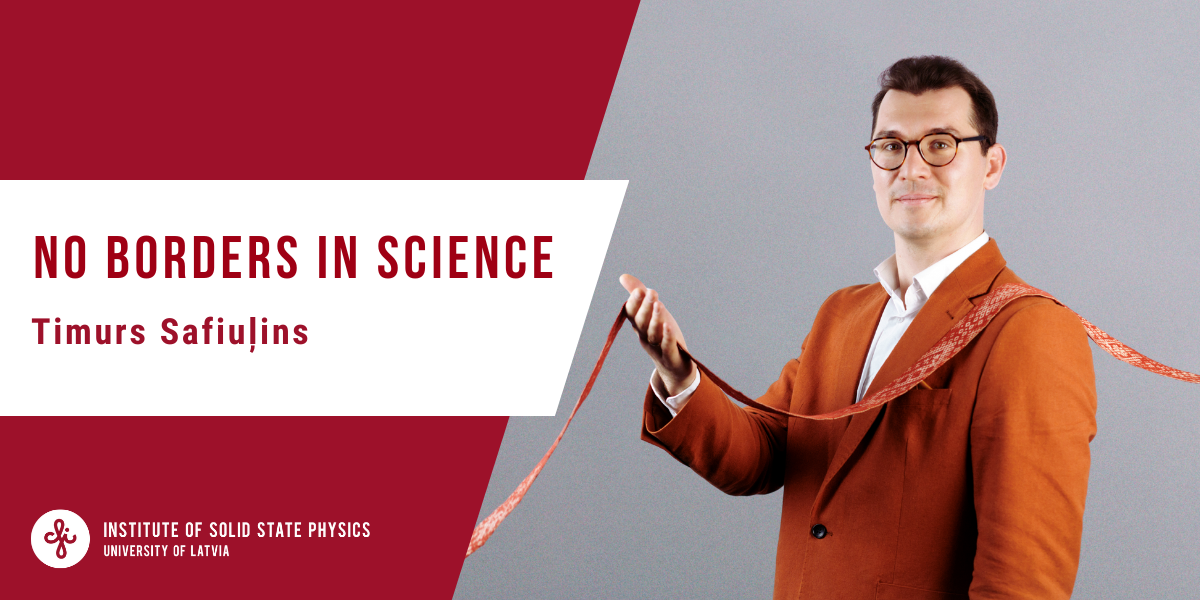
No Borders in Science is a series of interviews with Institute of Solid State Physics (ISSP UL) scientists and specialists who are closely connected to the world outside of Latvia – by birth, attained education, or just their daily work. Through their stories we want to highlight the institute as a part of the global scientific network – a centre of excellence where collaboration isn’t limited by geography and the exchange of ideas, experiences, and efforts is placed at the forefront. This time, we speak with Timurs Safiuļins about how to best assist researchers’ work and how valuable is good communication in the world of science.
In your own words, what is your specialty in the ISSP UL? Do you have any particular topics of interest in science?
I like to think of my job as helping scientists, and sometimes just giving them a little encouragement to keep going when the road feels long. No two days are the same. One moment I’m coordinating our scientific projects like SWEB and FeLow-D, the next I’m supporting new innovation proposals on all sorts of topics across our laboratories. I organise events, welcome international guests, and look for ways to expand our partner network. There’s a saying: The more languages you know, the more of a person you are. Same here, I just hope it doesn’t end up giving me a split personality!
As for science, I’m endlessly curious. My background is in economics, so working here often feels like stepping into a world full of wonders and magic. I’m especially fascinated by the practical side of research and the part where ideas make a real difference in the world. As a scuba diver, I have a soft spot for marine and underwater technologies, particularly robotics and underwater communication.
How did your journey lead outside of Latvia?
It all began in 2009, when I was still a bachelor’s student and joined the Erasmus programme to study at Ghent University. At the time, I couldn’t have imagined how often I’d return to Belgium in the years to come. After graduating, my career naturally moved into project management, mainly with an international focus. For a while, I spent nearly half my time travelling, eventually visiting every EU country. I represented Riga in several urban development networks, including Energy Cities and Eurocities, which gave me an incredible chance to experience working cultures beyond Latvia. Since 2018, I’ve also been part of the UN UNECE expert group. Collaborating with people from so many different countries has taught me to read between the lines of business culture, find common ground quickly, and focus on results. Every country has something to teach you, and there’s always a way to bring the best of those lessons back home.
And what led you back to the Institute of Solid State Physics?
Quite simply, a desire to do something meaningful for my country and its people. I believe that investing in science, especially in young scientists, is one of the most powerful ways to strengthen the national economy. I’m convinced that with the right effort, Latvia can earn a prominent place in the European scientific landscape. ISSP UL has everything it needs to achieve this, and our motto, Passion drives progress, really says it all.
How does the ISSP UL assist its employees (proliferating participation in projects and events, supporting funding acquisition, endorsing growth opportunities, etc.)?
In recent years, I’ve seen a real shift. This is the first workplace I’ve known where initiative is not just accepted but actively encouraged. We have a wonderfully diverse team with one shared goal, and we’re ready to help wherever it’s needed, from shaping a clear roadmap for an idea, to preparing the proposal itself, and even guiding it all the way from the laboratory to the market. I’m sure that ISSP UL is a place where you’re encouraged to grow, where the atmosphere is open, the collaboration is genuine, and the people make ideas come alive.
Currently, what is your next goal – career-wise or just in general?
Projects are my craft, so my short-term aim is to bring in new ERC and EIC Pathfinder grants for the ISSP UL. We’ll see which arrives first. Looking further ahead, I’d like to leave something lasting for science in Latvia. If I can’t forge an entirely new path, I’d like to share what I’ve learned – maybe by writing a practical guide to crafting successful project proposals, or a physics handbook for non-STEM readers… or perhaps both rolled into one.